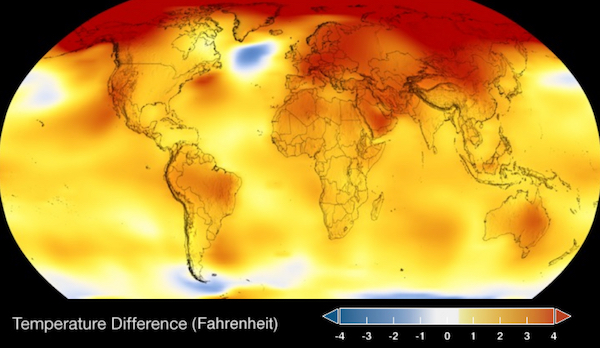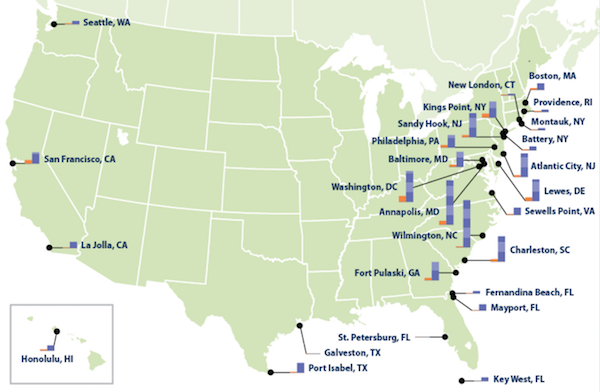Earth Day is this Monday (April 22), so I thought it would be helpful to list the top three things we can all do to lower emissions and cool the planet. First, though, here are a few visuals showing some of the impact the extra greenhouse gases are having on our planet.
Global temperatures are increasing rapidly:

2018 surface temperatures, relative to the 1951-1980 average. From https://climate.nasa.gov/vital-signs/global-temperature
Arctic sea ice is shrinking rapidly:

Arctic sea ice at its minimum phase, in 1979 and in 2018. From https://climate.nasa.gov/vital-signs/arctic-sea-ice
Coastal flooding is worsening rapidly:

Frequency of coastal flooding, comparing 2010-2015 (blue) with 1950-1959 (orange). From https://www.epa.gov/climate-indicators/climate-change-indicators-coastal-flooding
I find the Global Summary published each month as part of NOAA’s “State of the Climate” to be very informative. There are plenty more charts showing the progression of climate change at NOAA’s climate.gov dashboard and at the EPA’s climate indicators page.
Moving on to the good news: There is a lot that you can do. To keep it really simple, if you do nothing else, the top three things you should do are:
1. Drive a gas-powered vehicle less. Gas-powered vehicles are by far the biggest source of emissions on the peninsula. What alternatives will work for you?
- Buy, lease, or borrow an EV or PHEV (plug-in hybrid). They are fun to drive, low maintenance, can “fill up” at home while you sleep, and cost just one-third as much to “fill up” as gas. There is a reasonable used EV market now. For many lifestyles, this is the best fit.
- I know you’ve heard this before, but walk, bike or <insert your favorite alternative transportation mode here> when you can. Try out something new, like an e-bike or e-scooter. The rainy season is over, it’s nice to be outside…
- Carpool! Save time in traffic, lower emissions, and make friends all at the same time :)
- Consider transit. This is not a given, since transit here is not great. But when it does work, it’s easy and convenient. It makes most sense for a trip you do at least weekly. CityMapper, Transit, and Google Maps are apps that can show you the main transit options. I don’t think they have local options like the Marguerite and Palo Alto Shuttle, though.
2. Drive a gas-powered vehicle less. Seriously, this is so important that it deserves the top two spots on a three-spot list. I know it’s not easy, but if you nail this one, you get a pass on everything else for the rest of the year, it is that big. If you already use transit or bike, invite a friend or co-worker along, show them the ropes. And if you already drive an EV:
- Avoid charging it between 4pm - 9pm. Electricity is cleaner at other times.
- If you live in San Mateo County, sign up for ECO100, your 100% renewable electricity.
- Offer friends, neighbors, and colleagues a ride in your EV. Or just talk about why you are happy with it. Which brings me to...
3. Speak up. Voting is all-important. And protests can be helpful. But just as important is being willing and able to talk (and listen) on an everyday basis with friends, neighbors, and colleagues about climate change and things you are doing to help out. Advocate for changes in your community as well:
- Ask your city for better transit and more EV chargers. What do you need?
- Ask your workplace to install EV chargers -- fill up for free!
- Ask your workplace to limit air travel, and buy offsets when flights are necessary.
- Ask your favorite restaurants to provide more meatless options, or try an Impossible burger.
- Ask shops and vendors to focus on repairable items with limited packaging.
- And so on. Just speak up!
That’s pretty much it: reduce your gas-powered driving, try again to reduce your gas-powered driving, and speak up -- engage your community in conversation and action around climate change. That would be huge progress.
But this is an area that likes its extra credit. You can find more emission-reducing ideas (and an opportunity for a group challenge) for Palo Alto, Los Altos (and Hills), Menlo Park, and San Mateo County residents. (Mountain View is coming soon.) My top four options for extra credit are listed below. Apologies if this sounds preachy -- I don’t mean it that way. I am not very good at most of these, but I know they are big-emission items, so I’m paying attention and getting better. Don’t worry about perfection. Try something for a while, see if it sticks. Then add something else. Lather, rinse, repeat. At least, that’s my approach.
a) Eat a cow-lite diet and waste less food. Eat less beef (and lamb). Commit to your fruits and vegetables -- eat what you buy. And for extra extra credit, go easy on dairy (especially cheese). Fellow blogger Laura Stec published a corn croquette recipe a while back that looks worth a try when summer comes around.
b) Reduce, repair, reuse. Aka “buy less stuff”. Reduce your consumption emissions while also limiting waste and saving money. This is getting easier each year as companies focus more on sustainability.
c) Fly less. A good start might be to halve your overseas air travel and/or your transcontinental air travel. Any chance of replacing a local flight with a bus? When you do fly, buy certified offsets to cover your emissions. I use TerraPass, but there are a number of options.
d) Limit gas-powered home heat. Make sure you have and use a thermostat in cool weather. When your water heater dies (or better, before it dies, thanks Tom!), replace it with a heat pump water heater. For extra extra credit, install a heat pump for your home heating.
Finally, don’t forget to spend time outside! Enjoy this amazing place we live in with a walk or bike or beach visit or creek wade or gardening task or game of frisbee or ... and truly celebrate Earth Day!
Two Worthwhile Earth Day Activities
- In Menlo Park: Monday, April 22, 12:30pm: Celebrate the city’s new Climate and Sustainability Resolution in front of City Hall. Event information is here.
- In Palo Alto: Sunday, April 28, 2pm: Join Gunn and Paly high schoolers and local organization Community Climate Solutions to learn about practical, effective, and cost-saving actions you can take. Mitchell Park Library. Event information is here.
Comment Guidelines
I hope that your contributions will be an important part of this blog. To keep the discussion productive, please adhere to these guidelines, or your comment may be moderated:
- Avoid disrespectful, disparaging, snide, angry, or ad hominem comments.
- Stay fact-based, and provide references (esp links) as helpful.
- Stay on topic.
- In general, maintain this as a welcoming space for all readers.



